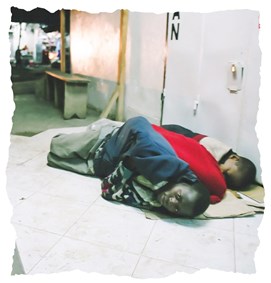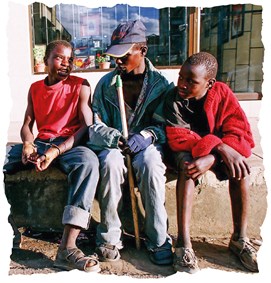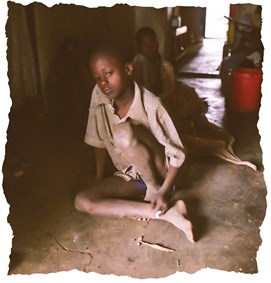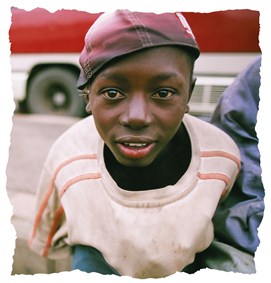
A first-hand experience of how child poverty in Africa impacts so many families
- Date: 27 May 2022
- Author: Matt Zeqiri
- In: Tanzania

It’s 5am and it’s still cool and dark, but the local bus terminal is waking up. I’m here to witness the work of our early morning outreach team who arrive on the streets at this time every day as the city comes to life.
Buses are arriving, doors are opening, passengers are disembarking. Hundreds of people are already here, most of them on their way to work. Traders are opening the shops that line the bus station’s perimeter, and food vendors are firing up their cooking equipment as they seek to tempt customers to part with a few shillings for a breakfast snack.

It is hard to calculate how many children in Africa are in poverty – but it is not hard to find them on an early morning walk through the streets. And the sight of these small, vulnerable sleeping children is a stark reminder of the dangers and trauma faced every day by every child in poverty in Africa. Ending up struggling to survive on the streets is commonplace and these children are a prime example of that hardship.
The first group of around 18 boys range from about eight to 12 years old. One group of four boys is relatively fortunate, with a blanket of some sort to lie on. The rest lie on the stone steps. A clutch of smaller boys lie huddled together for warmth and safety. One boy sleeps by himself, 20 feet away. I’m told it’s because he wets the bed. What bed? One of the groups start stirring. One small boy wakes with a very cheery “Good morning!” in perfect English while another immediately implores RCA’s outreach workers to help his friend Joseph.
Joseph* is about 13 and has been behaving strangely, his friend tells us. He has been having delusions and engaging in conversations and arguments with people who are not there. Yesterday his behaviour caused problems in the market and he was beaten by security guards. Badly, it seems. When he is woken up, he walks with a severe limp and needs to be helped the few hundred yards to RCA’s vehicles, where Elias (our youth facilitator) takes him to hospital. He is tested for malaria and will be assessed for mental ill-health. Tonight, Joseph will spend the night in the hospital. It’s far from ideal – healthcare is basic and patients’ food provisions are non-existent – but it’s a lot better than last night. I am struck by how much these boys care about each other. Joseph’s friend wept as he begged us to help.

Whatever the effects of poverty in Africa, one thing is clear, for these children many have adopted this challenging and dangerous lifestyle when their families have simply not been able to support them. Most of the children have been away from their families for a long time, many moving between cities by catching the bus. Not all of them pay a fare - some risk life and limb by climbing underneath and holding onto the chassis.
They know how dangerous it is – a boy who travelled the 18-hour journey from Dar es Salaam this way told me: "We know that one mistake and you're gone."
Among the daily risks these children face their futures are filled with the potential for:
But despite all this, they display the same energy and joy as any child, in any situation, anywhere around the world. Mwanza’s street children bound up to us when they spot our outreach team, keen to talk with ‘Teacher’ as they call the staff.
When outreach workers make these early morning walks, they are looking for children they haven’t seen before in order to make an intervention as quickly as possible – before someone else can get to them.

Today’s new boy is Eric*, who says he is 14 but looks more like 10. One of RCA’s staff notes that his Eric’s toenails are clean – a tell-tale sign that he is new to the streets. The children attempt to wash in a nearby river but a 24/7 street life is difficult to scrub off. Eric tells us he has been in Mwanza for a week. He ran away from his father’s house when a neighbour warned him that his stepmother was going to put something in his food.
The neighbour gave him TZS 6,000, which Eric used to flee on the bus. The first week of street life has been very hard. Eric is sleeping with a group but he is hyper-vigilant about others, and he has every justification. Older boys have been stealing his food, leaving him hungry.
Eric is tired too, as this experience has left him wary of other children; to protect himself, he waits until the others are asleep before he goes to sleep, and he gets up as soon as others around him start to stir.
Within an hour, Eric’s prospects are looking better thanks to our outreach team. He was happy to accompany us to RCA’s office, asleep in fresh clothes, as we start to try to trace his mother – a process that involves using local community networks to piece together the information Eric can provide. It may be a long process, but we don’t want him back on the streets, so a temporary foster carer is found called Farida. Farida lives 25 minutes from RCA’s office with two children of her own and is delighted to have the opportunity to give a child a safe place to stay. Eric can live with Farida for up to six months, which we hope will give the team time to reunite him with his mum.

Despite the terrible situations they face, the trauma most of them have experienced, and the constant fear and hunger they live with, the children I met waking up on the streets of Mwanza seem generally happy.
Someone mentions that they can get a football from a Community Champion at 7.30am, and off they go at an incredible speed – leaving a trail of dust and laughter in their wake.
*Names have been changed to protect children's identities.